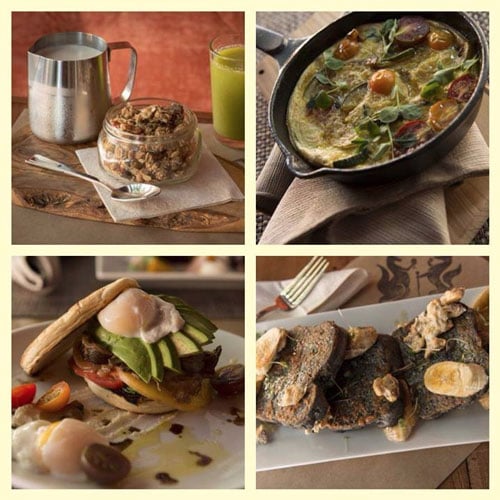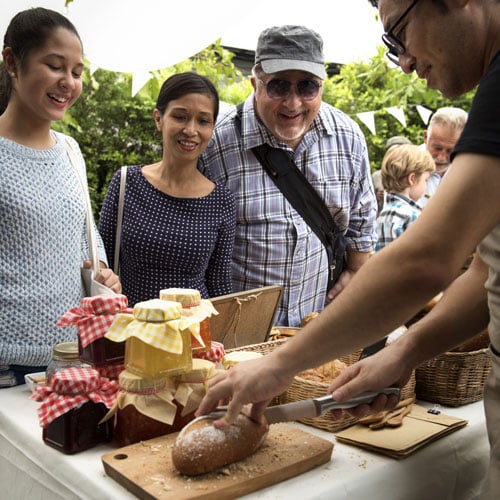
You’ve successfully purchased a location and transformed it into a brand new restaurant. The space is furnished, the kitchen is stocked, and the menu is written. What’s next? How do you get your restaurant in business? If you plan to open a new restaurant, consider hosting a series of soft openings, or soft launches, to give your staff and kitchen equipment a test run before officially opening your doors to the public.
If the coronavirus has forced you to temporarily shut your doors, you can ease back into the business by hosting a soft opening when you're ready to reopen your restaurant.
We explored some options and tips for a soft opening that can lead to a successful grand opening.
What Is a Soft Opening?
A soft opening or soft launch is the opening of a business for a limited number of people at first to test its services and make improvements. While a grand opening occurs on the actual day your restaurant opens its doors to the public, a soft opening is a beta test that happens well before your restaurant officially opens. There are several advantages and some disadvantages to hosting a soft opening.
Advantages of a Soft Opening
A soft opening is not a requirement, but there are clear advantages of hosting one before fully opening your doors. Here are some of the major advantages:
- Get feedback: Collect comments directly from customers on the food, drinks, service, and overall atmosphere.
- Iron out logistics of your location: Focus on evaluating the seating capacity, the flow of the space, the point-of-sale system, and the kitchen equipment.
- Prepare the staff: Allow staff to practice menu knowledge and learn how to be a good server, creating consistency among staff members.
- Build anticipation: Get the word out about your new location by encouraging guests to tell their friends about their experience.
- Make adjustments: Implement the feedback and tweak things that could use improvement before opening.
Disadvantages of a Soft Opening
It is important to note that there are some disadvantages to hosting a soft opening:
- Creates urgency to open: A soft opening should be hosted with a grand opening date in mind. That date should not be too long after the soft launch or else the hype will die down, and your customers may forget or lose interest.
- Exposes ideas to competitors: A soft launch exposes your ideas to the world which may end up in the hands of a competitor. Delay your grand opening too long, and they may have a chance to implement those ideas before you open.
- Potential low-quality feedback: Hosting a friends and family restaurant soft opening may not provide you with the best feedback. Those closest to you may want to spare your feelings when it comes to criticisms, so encourage them to be open and honest with constructive feedback, or invite additional guests outside of your inner circle.
Soft Opening Invitation
The soft opening invitations you send out are an important part of enticing people to test out your restaurant. Depending on how many people you are inviting and your style, you can either email the invite for a more casual feel or send a physical invitation in the mail for something more upscale. Don’t forget to choose a memorable design to grab your guests’ attention. Regardless of how the invitation is sent, the expectations for the event should be listed. Here is a list of what to include on a soft launch invitation:

- Date
- Time
- Address
- Pricing: Free, Flat Rate, or Menu Pricing
- RSVP Method and Date
- Dress Code
Timing and Capacity
It may be difficult to gauge how many people you can handle for your soft opening. Some locations have all of their guests served during the same time slot. However, staggering the guests provides a realistic flow of service in your location. A common number of guests to invite in a night is usually 100 people, broken up into different time slots.
For example, if your event begins at 6 p.m., you would invite 25 people to arrive at 6 p.m., 25 more to arrive at 6:30 p.m., and so on. With this concept, your staff also gets practice serving different stages of a meal at once. One aspect to decide upon is if you will be allowing walk-ins and how many extra people you can fit in your location at a given time. By inviting people beforehand while still allotting space for more, you can gauge how your restaurant handles both your reservation system and walk-in crowds.
Building a Soft Opening Guest List
You may be tempted to open your doors to the public right away for your soft launch. However, who you invite can have a strong impact on your success moving forward.
Invite Familiar Faces
Friends and family are much more forgiving in the event of rough patches during your soft opening. A crowd of familiar faces will give you constructive criticism, offering insight while being aware that this is, in fact, a test run. Just remind them to be honest, since friends and family are also more likely to try and spare your feelings.
By inviting people you know, it's easier to follow up with them for critiques. This allows you to assess your strengths and weaknesses to make those final tweaks before opening to the public. Familiar faces are also more likely to provide you with free advertising and help build anticipation before you officially open.
Contact Local Business Owners
To introduce themselves to local business owners, many restaurant owners will host a soft opening event just for the surrounding businesses in their area. A soft opening is usually a restaurant’s first introduction to the local community, making it a great time to create a strong first impression with other local business owners.
By hosting a meal or happy hour just for local businesses, you’re expressing an interest to contribute to the established community you have joined. In doing so, you might earn some bookings for upcoming events and meal slots. Forming professional relationships with other community businesses is vital to your success, so be sure to make a strong first impression.
Reach Out to Community Leaders and Influencers
Prominent local leaders and community influencers are great guests to invite to a restaurant soft opening. These individuals have lots of pull within a local community, meaning that they can generate positive word-of-mouth advertising.
Community leaders and influencers often have followings of people that other community members don’t have. Positive reviews from these important individuals can raise your restaurant’s reputation and launch your business with a running head start. Just be prepared to pull out all the stops to impress these people, as their words have a lot of weight behind them and negative reviews from them can do more harm than good.
How to Make a Soft Opening Menu
Once you’ve decided that a soft opening is a good option for your establishment, the next step is to put together a menu for the occasion. There are a few factors to decide upon before you can host your soft opening. Each type of soft opening menu has pros and cons, so it's up to you to decide which type of soft opening menu best fits your establishment.
1. Full Menu Soft Opening
For those restaurants that are close to their grand opening date, offering a full menu soft opening may be the perfect beta test before your actual launch. Offering your restaurant’s complete menu during a soft opening provides a comprehensive overview of the establishment, allowing you to get feedback on all of your dishes. A full menu soft opening will provide you with the most relevant and precise feedback, as the soft opening essentially simulates how your grand opening will go.
Although serving your entire menu at a soft opening provides great feedback, there are some drawbacks to hosting such an intricate event. You need to be fully prepared to host a full menu soft opening, meaning that every aspect of your restaurant needs to be ready to launch. A soft opening with an all-encompassing menu also makes it difficult to pinpoint problem areas and mistakes, as you’re testing so many aspects at once. Full menu soft openings provide great feedback, but hosting one likely won’t be the smoothest process unless you’re completely ready for the challenge.
2. Spotlight Signature Dishes from the Menu

To ensure that your restaurant stands out from Day 1, serve signature dishes during your soft opening that give guests something to talk about. If you have dishes that are specifically made to match your theme, your soft launch is the perfect time to showcase them. This is also a great time to release a beta menu.
This means you only display a few dishes but let your customers know that more additions to the menu are coming, giving them a reason to return after your grand opening to try more food options. By test running your signature dishes, you have a chance to provide your customers with a memorable meal but also make minor adjustments before your doors are open. You can also host multiple soft opening events featuring different parts of the menu each time, which we will explore further.
3. Target a Time Span
There is no exact formula on the timeline a soft opening should take, however, the general time frame ranges from 3 days up to two weeks. Your time span will help you determine how many events to have within that time and what to serve on which days. Two soft opening strategies are outlined below that may work for your establishment.
Three-Day Strategy:
This style is more of an intimate sneak peek and is usually done through personal invitation.
- Day 1: A cocktail hour featuring appetizers and beverages for friends, family, and local business owners
- Day 2: A breakfast and lunch meal for friends and family
- Day 3: A dinner meal for friends and family
One to Two-Week Strategy:
Think of this as a multi-course meal served over the span of several days. This requires a bit more advertising.
- Two nights of full menu service for just friends and family
- One night of full menu service for local business owners
- One day to launch a breakfast menu that is open to the public
- One day to feature Sunday brunch that is open to the public
- One day to serve a lunch menu that is open to the public
- One day to launch a dinner menu that is open to the public
- One night of Happy Hour that is open to the public
4. Pick a Pricing Strategy
Restaurant menu pricing for a soft opening varies from case to case. Some restaurants offer completely free food, a discounted menu, or a meal selection limited to just a few full-priced options. If you plan on charging full price, be sure to include freebies as a ‘thank you’ for guests' input.
This is a good way to have customers try a variety of menu items that they may not have selected to purchase with their meal. These selections can include an appetizer or dessert sampler platter, a drink flight, or your signature cocktail free of charge. If you do choose to provide a completely complimentary event, just be conscious of your budget so it doesn’t end up hurting you rather than helping.
Back to TopCreate a Neighborhood Presence with a Restaurant Soft Opening
Integrating your business into the local neighborhood is an important part of establishing a loyal customer base. Creating a neighborhood presence before your grand opening date allows you to get a head start on forming connections with community members who may one day become your regular customers.
Opening Events

Turning your restaurant’s soft opening into a community event goes a long way in establishing roots in your local community. If possible, try incorporating entertainment like live music, photo booths, or games, turning your soft opening into a celebration. Guests will be more likely to come when there are other amenities present. Also, turning your soft opening into a community event may boost attendees’ enjoyment of the event and help establish important connections with local patrons.
Showcase Your Business Before Opening
By announcing your restaurant's presence before officially opening your doors to the public, you'll build anticipation leading up to your grand reveal. What better way to do so than with a live showcase of your menu during your soft opening? Consider operating your own grab-and-go stand that customers can swing by to extend your restaurant services prior to opening.
If that option isn't available, seek out other local opportunities to grant a sneak peek at your food. Are there any local food shows or community events you could feature a stand at or cater to get your name known? These restaurant marketing tactics speak volumes more than any flyer or social media posting.
Collect Feedback From Your Soft Opening
Once you have finished preparing for your soft opening by selecting a menu, inviting your guests, and reaching out to your community, there is one critical step left: collect feedback. The feedback gathered from your guests during your soft launch is extremely valuable in order to make improvements before you open to the public.
It is for that reason that your feedback should be gathered in writing. If just spoken to a server during the event, the details of the feedback may be forgotten. Instead, you can hand out a feedback form with the check at the end of the meal and even offer coupons for completed forms. Feedback from your soft opening can help make sure your grand opening is a success.
Back to TopA soft opening may feel like an additional step delaying you from opening your doors, but it can be highly valuable to your restaurant’s success. It provides the opportunity to find areas of improvement and get in some much-needed practice before officially opening your establishment. When planning for your soft launch, be sure to select your menu and guest list wisely to make the most of the experience.





